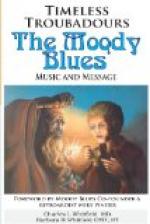The greater part of this poetry repeats, in another language, the well-worn mannerisms of the troubadours: we find the usual introductory references to the spring or winter seasons, the wounding glances of ladies’ eyes, the tyranny of love, the reluctance to be released from his chains and so forth, decked out with complications of stanza form and rime-distribution. Dialectical subtlety is not absent, and occasionally some glow of natural feeling may be perceived; but that school in general was careful to avoid the vulgarity of unpremeditated emotion and appealed only to a restricted class of the initiated. Changes in the constitution and customs of society brought this school [134] to an end at the close of the thirteenth century, and a new period of lyric poetry was introduced by Guillaume de Machaut and Eustache Deschamps.
Of the troubadours in England there is little to be said. The subject has hitherto received but scanty attention. Richard Coeur de Lion was as much French as English; his mother, Queen Eleanor, as we have seen, was Southern French by birth and a patroness of troubadours. Richard followed her example; his praises are repeated by many troubadours. What truth there may be in Roger of Hovenden’s statement concerning his motives cannot be said; “Hic ad augmentum et famam sui nominis emendicata carmina et rhythmos adulatorios comparabat et de regno Francorum cantores et joculatores muneribus allexerat ut de illo canerent in plateis, et jam dicebatur ubique, quod non erat talis in orbe.” The manuscripts have preserved two poems attributed to him, one referring to a difference with the Dauphin of Auvergne, Robert I. (1169-1234), the other a lament describing his feelings during his imprisonment in Germany (1192-1194). Both are in French though a Provencal verson is extant of the latter. The story of Richard’s discovery by Blondel is pure fiction.[35]
From the time of Henry II. to that of Edward I. England was in constant [135] communication with Central and Southern France and a considerable number of Provencals visited England at different times and especially in the reign of Henry III.; Bernard de Ventadour, Marcabrun and Savaric de Mauleon are mentioned among them. Though opportunity was thus provided for the entry of Provencal influence during the period when a general stimulus was given to lyric poetry throughout Western Europe, Norman French was the literary language of England during the earlier part of that age and it was not until the second half of the thirteenth century that English lyric poetry appeared. Nevertheless, traces of Provencal influence are unmistakably apparent in this Middle English lyric poetry. But even before this time Anglo-Latin and Anglo-Norman literature was similarly affected. William of Malmesbury says that the Norman Thomas, Archbishop of York, the opponent of Anselm wrote religious songs in imitation of those performed by jongleurs; “si quis in auditu ejus arte joculatoria aliquid vocale sonaret,




